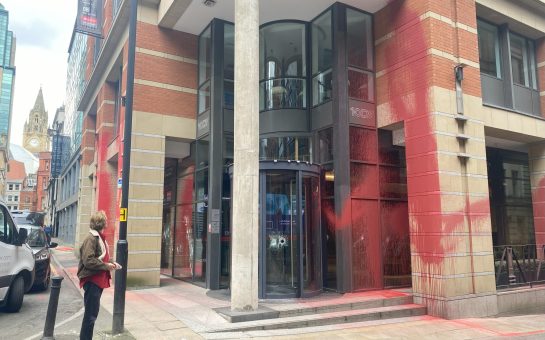Ji Hyun Park was born and raised in North Korea. Two escape attempts, sex slavery, and a stint in prison camp later, now she lives in Bury.
Mention North Korea to anyone and striking images will likely fill their head. Vast military parades through the central square of the nation’s capital. Endless streams of soldiers proudly goose-stepping before their commanders. Fawning civilians prostrating themselves before giant statues of their dear leaders.
Given recent developments, some might even envisage a mushroom cloud.
This is the strong image that the Kim regime likes to present, yet for the average North Korean the reality of their lives is far from glorious. Ji Hyun Park, a refugee from North Korea now living in the UK, says: “This world can’t imagine this country.”
To begin with, she had the standard upbringing for children in North Korea.
“When I was a child, we learned the history of the revolution. They told us Kim Il-sung is a god and the greatest leader in the world, not only in North Korea.”
There was little to no access of foreign media. All information was provided by a single TV channel and the government newspaper.
Escape from North Korea is fraught with danger – this is no secret. Attempting to leave by either South Korea in the south or China in the north presents different problems of their own. South Korea seems like the most logical country to head to, but anyone fortunate enough to evade the guards at the border will find themselves in a literal minefield.
The other route – and the one which Ji Hyun took – is to head north and cross the river into China. Yet taking this route is just as risky. Korean refugees captured by the Chinese authorities face repatriation and imprisonment for defiance of their dear leader Kim Jong-un.
Kim is the third Supreme Leader of North Korea, having acceded to the throne of the hermit kingdom in 2011. The Kim dynasty began with Kim Il-sung, who founded the Democratic People’s Republic of Korea in 1948 following the end of the Japanese occupation.
After Kim Il-sung’s death in 1994, he was granted god status with the title of Eternal President while his son Kim Jong-il took over as Supreme leader.
His death in 2011 expanded the pantheon of North Korean deities, being declared Eternal General Secretary of the Workers Party of Korea.
Their collective rule has been condemned all over the world for flagrant human rights abuses.
So, in 1998, aged 30, Ji Hyun made her first escape.
Mass famine was ravaging the nation at this time. Three million people died of starvation, including Ji Hyun’s uncle. She and her brother left North Korea into China, leaving the rest of their family behind.
“I still don’t know when my father passed away.”
Once in China, Ji Hyun and her brother believed that they were free – they could start a new life away from the hegemonic regime of Kim Jong-il.
It was not to be.
They ended up ensnared by human traffickers, who took Ji Hyun into slavery and had her brother repatriated to North Korea. She still has no idea what happened to him.
She explained that the Chinese are not accepting of North Korean women – they would either be workers or sex slaves. While in China, Ji Hyun gave birth to a child.
Even after all this, she was still repatriated to North Korea five years later.
In their 2017/18 report on the nation, Amnesty International suggests that Ji Hyun’s story is commonplace among women attempting to leave North Korea – many make deals with human traffickers, and are often subjected to abuse from their captors.
There are also details the horrors or North Korea’s notorious prison camps. Amnesty International estimates that as many as 120,000 people are under arbitrary detention in North Korea, and inmates are said to be repeatedly subjugated to forced labour and torture.
Ji Hyun’s description of her own experience in one of these camps details this horror in vivid reality. She describes how the inmates were forced to work manual labour all day long, with no shoes and no proper toilets.
But after six months, Ji Hyun severely injured her leg in an accident, leading to near fatal complications. The North Korean authorities were not prepared to let her die inside the camp, so they released her. Close to death, she made contact with the human traffickers once again and returned to China.
The same risks were there as before. If she was caught again, she would be repatriated again. But her young son was still in China – at this point, he was the only family she had.
This time, however, luck was on their side.
In 2007, Ji Hyun met an American Korean pastor in Beijing. It was he who found them a way out of this life and helped them move to England.
Ten years after her first escape, Ji Hyun arrived in the UK.
“When I got the refugee visa, I nearly cried. It is a small ID card, but it saved my life.”
Since living in Bury, Ji Hyun has worked with Connect: North Korea, an organisation dedicated to helping Korean refugees into their new lives.
There are many challenges facing refugees, not least of which is learning to speak English. Ji Hyun describes this as Connect: North Korea’s first goal for helping refugees. They offer book clubs and writing clubs to help work on their language skills.
She faced this problem herself upon her arrival to England. When her son passed exams to enter Bury Grammar School, she received a scholarship letter from the school. She couldn’t understand the letter, so her son didn’t get to go there. As a result of this, she set out to learn the language herself.
Connect: North Korea estimates that there are about 700 North Korean refugees living in the UK, many of whom are in London.
In 2017, North Korea forced itself into international attention with the advance of its nuclear weapons programme. Tensions reached critical levels, with speculation that Korean ICBMs now had the potential to reach the continental United States. President Trump, with his typical chest-thumping ‘America First’ rhetoric, issued apocalyptic threats to Kim.
Many thought this might be it. The world would soon be destroyed in a blast of ‘fire and fury’. The Economist ran a front page cover featuring Kim and Trump’s faces forming a mushroom cloud with three simple words: It Could Happen.
In spite of this, tensions appeared to rapidly defuse in early 2018. Kim Jong-un made a historic meeting with South Korean president Moon Jae-in across the demilitarised zone. In June, Donald Trump became the first US president to meet with a North Korean leader at a summit in Singapore – something that might be described as his ‘Nixon in China’ moment.
There has even been talk of denuclearisation of the Korean peninsula.
Ji Hyun is sceptical.
She estimates that Kim’s recent posturing on the world stage has been an act of desperation. International sanctions have forced Kim to attempt diplomacy.
She adds: “Kim Jong-un has never said he’s going to give up his nuclear weapons, you never heard that.
“Nuclear weapons are Kim Jong-un’s power.”
Ji Hyun is one of a number of refugees who managed to make it out of North Korea alive. Others are not so fortunate. Many are arrested in China. Many die on the journey. Many face the horrors of repatriation.
But she believes all should remain defiant in the face of tyranny.
“In the UK I learned that refugees are stronger people than evil dictators, because refugees always fight.”
Image courtesy of Gabriel Britto via Flickr, with thanks.



